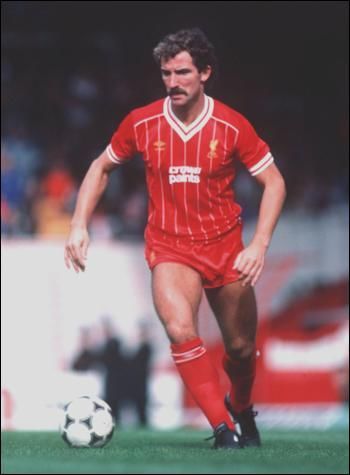|

Born:
Edinburg, 6.5. 1953
Signed:
1978
Transfer fee: £352.000
(from Middlesbrough)
Games:
247
Goals:
38
Other clubs
as player:
Tottenham (1970-72), Montreal Olympique (1972), Middlesbrough (1972-78),
West Adelaide (1978), Sampdoria (1984-86), Glasgow Rangers (1986-91)
Honours as player:
Liverpool:
European Cup 1977/78, 1980/81, 1983/84
League Championship 1978/79, 1979/80, 1981/82, 1982/83, 1983/84
League Cup 1980/81, 1981/82, 1982/83, 1983/84
Charity Shield 1979/80, 1980/81, 1982/83,
Tottenham:
FA Youth Cup 1968/69
Middlesbrough: Second Division 1973/74
Sampdoria:
Coppa Italia 1984/85
Glasgow Rangers: Scottish Premier League 1986/87
Scottish League Cup 1986/87, 1987/88
Scotland:
54 (4 goals)
Other clubs
as manager:
Glasgow Rangers (1986-91), Galatasaray (1995-96), Southampton (1996-97),
Torino (1997), Benfica (1997-99), Blackburn (2000-04), Newcastle
(2004-06)
Honours as manager:
Liverpool:
FA Cup 1991/92
Glasgow Rangers: Scottish Premier League 1986/87, 1988/89, 1989/90,
1990/91
Scottish League Cup 1986/87, 1987/88, 1988/89, 1990/91
Galatasaray: Turkish Cup
1995/96
Turkish Super Cup 1996/97
Blackburn:
League Cup 2001/02
Personal honours as a player or manager:
Included in Football League 100 Legends list (1998)
Included in English Football Hall of Fame (2007)
Souness is one of 64 players elected to Rangers' official Hall of Fame.
Souness is one of 24 players qualifying for
the Scottish national team Hall of Fame. |
|
In six successful seasons as a Liverpool
player Graeme Souness was at the heart of Liverpool's triumphs.
Memorably described as "a bear of a player with the delicacy of a
violinist" he was a high-octane blend of amazing strength and bewitching
subtlety.
One of Bob Paisley's majestic trio of Scottish captures, with Kenny
Dalglish and Alan Hansen, he cost £352,000 from Middlesbrough in January
1978 . Five months later he supplied the pass at Wembley for his
room-mate Dalglish to score the goal that beat Bruges to retain the
European Cup. In general during his Anfield career the Scotland captain
responded brilliantly to Paisley's demand to curb his explosive
temperament and he became a midfielder of immense stature.
He moved to Italian football in 1984 but returned to the UK as
player/manager with Glasgow Rangers, leading them to the Scottish
championship. Following the surprise resignation of Kenny Dalglish he
seemed the obvious successor and enthusiastically took up the task of
building a new Liverpool team.
However his time as manager at the club has become synonymous with
mistakes, ill-judged media representation, poor transfer decisions and
falling standards on the pitch. Mature reflection by Souness and the
Club shows that in fact his mangership was not without success and his
failures were not totally of his own making. Liverpool won the FA Cup in
1992 and this was despite life-threatening heart surgery in the days
prior to Souness gingerly leading out his players.
Souness sadly, marred this triumph by poorly timed publicity in the Sun
newspaper. He explained the story himself in 1999, in an interview with
Garth Crooks: "Because the game went to penalties, the paper missed the
deadline. That picture [of Souness with his future bride] ended up in
the newspaper on the Wednesday - the anniversary of the Hillsborough
disaster. I should have resigned then, looking back.
"I will forever be sorry it happened. It was out of my control. I was in
hospital having an operation which, as it turned out, was life
threatening. It was a foolish mistake, but when somebody tells you at 37
that you are going to have open heart surgery and that you might die,
how would you react? I reacted in a way which I'll regret for the rest
of my life. I'm sorry to the people on Merseyside whom I offended and I
shall eternally be sorry".
In other respects as Souness himself reflected in December 1999 "in the
right place at the wrong time". He explains: "What has happened since
has gone to prove that I was not to blame for all the ills...my problem
was that I tried to change it too quickly." He admits that he was
shocked to the core by a change in the attitude amongst his squad and
that this led to rapid hiring and firing as he sought to remove players
who despite ability, offended this dedicated professional: "I found the
change of mood in the dressing room both startling and alarming. How
could standards have slipped so badly? I could not accept the lack of
determination and fire in their bodies to win games for Liverpool".
Whilst this was a sentiment shared by all Reds fans, his choices of
replacement was at times woefully poor, with Paul Stewart and Torben
Piechnik standing as testimony to this fact. The removal of the 'Boot
Room' under Souness is often quoted as one of his great mistakes - in
actual fact it was a proposal planned by the directors at the time of
Dalglish and was not a Souness decision.
All the training and behind-the-scenes work had been, and continued to
be, managed by Ronnie Moran. No changes were made to a system that had
worked for years. The conversion of a small boot store to a press room
has become a symbol of the frustration of the fans, whereas it played no
actual part in the under-achievement of this period.
Souness is an intelligent, articulate and highly motivated man, he was
an awesome captain for the club and gave his all to the job as manager.
Sadly his memory is still tarnished, but perhaps in time his faults will
be forgiven and his valuable FA Cup win given the appreciation it is
deserved. (LFC Official Website)

Thor Zakariassen ©
|